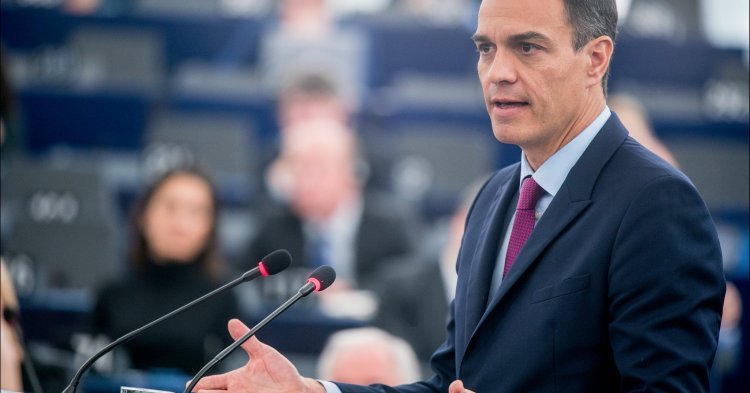The campaign was, from a very early stage, pitched as a fight between two blocks: the centre-left PSOE and left-wing Podemos against ALDE member Ciudadanos (Citizens), the Popular Party (PP) and the far-right Vox. Throughout the campaign, both the national and the international press warned of two risks. On the one hand, the possibility of a hung parliament, with the risk of an ‘Italianised’ Spain in which forming a stable government would become borderline impossible. On the other, the surge of Vox, the party advised by Steve Bannon and which was building on the momentum it had gained after obtaining its first-ever regional representatives in the Andalusian election in December.
Last night’s election yields a stunning (and complex) composition in the Parliament. PSOE is the clear winner of the night, with 123 MPs, up 38 from 2016, defying a ‘Pasokisation’ [1] which many had declared irreversible. Ciudadanos, which has significantly shifted to the right in the past year, obtained 57 MPs, making considerable gains which will trigger a fierce fight with PP to declare themselves the moral leaders of the opposition. Podemos, while obtaining, at 42, fewer MPs than in the previous elections, have mitigated their losses, and will seek to form a coalition with Sánchez.
The Popular Party are, undoubtedly, Sunday’s biggest loser, returning an all-time low of 66 MPs and 4 million votes, and having lost 120 MPs and 6 million votes since 2011. On the far right of the chamber, the newly elected Vox, the popularity of which has been largely fed by the Catalan crisis, had a bittersweet night. Despite obtaining 10% of the vote and 24 MPs, increasing their share of the vote by two million votes, their expectations were significantly higher, with the exit poll predicting around 40 MPs and the national executive hoping to become the kingmaker for the Popular Party. They will enter the Spanish parliament for the first time in history, but will do so as yet another opposition party, unlikely to gain representation within the chamber’s governing body.
Key factors in the election
How can last night’s results be explained? A key figure is the turnout, which, at 75.7%, was 9.5 points higher than in the previous election. This high turnout, which has traditionally been thought to benefit the Left, can be explained by reference to the voto del miedo (the ‘fear-based’ vote). The ‘Andalusian ghost’, referring to the confidence-and-supply agreement the PP/Ciudadanos coalition and Vox signed in Andalusia, was frequently brought up by both left-wing parties throughout the campaign, with PSOE declaring a choice between progress and a return to a dark past, and Podemos labelling it a ‘constitutive election’, which would define the country for decades to come.
In an electoral system (the D’Hondt system) which has traditionally favoured a united political right, the emergence of Ciudadanos and Vox alongside the Popular Party has, this time, benefitted the left, leading to a fragmentation of the right-wing vote and adding up to a mere 147 MPs, only ten more than those obtained by Rajoy in 2016 and 39 less than in 2011. It would be naïve, however, to lay the blame on the electoral system. The recently elected PP leader, Pablo Casado, has led a considerable shift to the right, with the party adopting a significant part of Vox’s populist discourse on issues such as Catalonia, abortion and immigration. The extent to which it has backfired is, perhaps, a reminder not only that Spain is, as The Economist recently wrote, an open and tolerant society, but also that adopting the discourse of the far right, as has so often been seen throughout Europe, hardly ever proves successful for centre-right parties.
Pedro Sánchez now faces three options. On the one hand, he can strike a new deal with Podemos, Basque nationalists and independent MPs, which could, but need not, result in a formal coalition government. On the other hand, he can seek a coalition with Ciudadanos. Finally, he can, as the deputy prime minister has suggested this morning, attempt to govern on his own, through an unlikely confidence-and-supply deal with Podemos, Catalan and Basque nationalists and independent MPs. Of these options, the latter seems the least likely (PSOE being 53 MPs away from an absolute majority), and an alliance with Ciudadanos’ Albert Rivera seems the least favoured by an electorate which has shifted to the left – with the crowd of thousands of supporters, who last night gathered outside PSOE’s headquarters, chanting “not with Rivera”.
The Catalan crisis
Sunday’s results could be good news for the Catalan crisis, and are certainly good news for Europe. On one level, this is because secessionist parties, despite the Catalan Republican Left (ERC)’s increase in MPs, obtained a mere 39.4% of the votes – hardly enough to view independence as “the will of the people” – with Carles Puigdemont and Quim Torra’s more radical Junts per Catalunya (Together for Catalonia) coming second within the secessionist fight. Moreover, for the first time in history, the left-wing ERC gained the most seats in the region, with PSOE’s sister party the Party of Catalan Socialists (PSC) coming second.
Last night also saw the Right’s defeat in the region, with PP, Ciudadanos and Vox, which called for different degrees of suspension of Catalan autonomy, obtaining a combined 7 of 32 seats. This has to be coupled with PSOE’s absolute majority in the Senate, its first since 1989 and which grants it the final say over any application of Article 155 of the Spanish constitution – modelled on the German concept of Bundeszwang and which allows the government, with the Senate’s authorisation, to suspend the powers of an autonomous region.
If Sánchez decides not to strike a deal with Ciudadanos, he may need the help of ERC, even if only through its abstention. With both parties aware that Sánchez will never allow an independence referendum, having promised dialogue within Spain’s constitutional framework, and with the Supreme Court’s ruling on the former Catalan leaders (prosecuted for embezzlement of public funds, disobedience, sedition and rebellion) expected for this autumn, it remains to be seen which attitude ERC will adopt: whether it will maintain its hardline stance, demanding an impossible referendum and risking the country’s stability, or settle for a more pragmatic course, agreeing to enter into negotiations to expand Catalonia’s devolved powers.
There is a chance, which will hopefully be sought, that a strong progressive national government and the defeat of Catalonia’s biggest hardliners will pave the way for a cooling down of the regional crisis, allowing stakeholders to focus on the social and economic policy which Puigdemont and Torra’s austerity, alongside their pursuit of independence at all costs, have neglected for years.
A victory for Europe
Where does Sunday’s election leave Europe? The absence of European policy from this year’s campaign, which has largely focused on economic issues and on questions of national identity, need not be a worrying sign. After all, the pro-Europeanism of the Spanish public (with only 13% of the public viewing the EU as negative, according to the latest Eurobarometer) is reflected in the main political parties, among which there is widespread pro-Europeanism and where only Vox, likely to join the ECR following the 2019 election, can be considered a ‘soft’ Eurosceptic party.
In his speech last night, Sánchez announced that he will seek to form a pro-European government: one which “seeks to strengthen, not weaken”, the Union. For the past year, he has been a famous Europhile, appointing leading continental actors (including former European Parliament President Josep Borrell, former Director-General for the EU Budget Nadia Calviño and former EESC Secretary-General Luis Planas) to his Cabinet and leading calls for a more social and cohesive Europe.
A stable government, coupled with the Euroscepticism of Poland, Italy and the UK, is likely to increase his relevance within the Council, where he has been seen as the third man in the Franco-German alliance. It can also provide a silver lining for the Socialists and Democrats, who seem to be facing a seemingly never-ending ‘Pasokisation’ and are set to lose some 50 MEPs in next month’s European election. Sánchez’s victory is undoubtedly a victory for Europe.
As for Spain, the end of one campaign marks the start of another. On May 26th, the country will once again head to the polls, on a date which will combine the local, regional and European elections. The newly elected national Parliament will sit for first time at around the same date, with Sánchez having until early June to form a government. What impact yesterday’s election will have, and the extent to which the May election will affect it, remains to be seen.



Follow the comments: |
|
